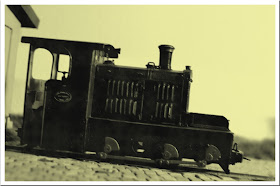 |
| A train of skips pulled by a loco built by Danish manufacturer Pedershaab. The photo has unfortunately been damaged by humidity. |
Originally the company relied on horses to pull the skips from the pits. Recent findings have confirmed rumours that Nystrup Gravel took delivery of one or even two one cylinder oil engine loco between 1908 and 1910 from two different Danish manufacturers. In 1918 the company acquired their first steam loco. From the late 1920’s Danish built petrol locos supplanted the 2 steam locos. The first diesel loco was a Fowler bought in 1933 as part of Nystrup Gravel's expansion to meet the demand for gravel to the many government construction projects to fight unemployment. By the late 1940’s the steam locos were used only when urgent orders of gravel had to be handled.
 |
| The Fowler outside the loco shed. probably photographed shortly after delivery as the loco is still devoid of numbering. Photo: Beldringe Local Historical Society. |
During the German occupation of Denmark 1940-1945 the Germans started to build an air field not far from Nystrup. Nystrup Gravel supplied a lot of gravel to the construction site. The company didn't miss the opportunity to make good profits during the occupation - even working in two shifts during the summer months. After the war the company took advantage of the many machines used at the air field and acquired several of them. One of Nystrup Gravel's 600 mm. lines passed close by the outer defensive perimeter of the air field and the railway was unique among Danish industrial railways in having a view to several machine gun nests from the train. Nystrup Gravel's director Holm was for a short period after the war accused of collaboration with the German occupiers because of his efforts to raise production. No official charges were made, however, and he was released from captivity after a few days in May 1945.
Gravel production at Nystrup Gravel gradually dwindled through the mid 1960's and the last load of gravel was delivered in 1969. The company was finally dissolved in the late 1970´s. The gravel business in Denmark changed during the late sixties and as the management of Nystrup Gravel never seriously took modern machinery into consideration, gravel from Nystrup wasn't competitive. As the major stock owner, director Holm, wanted to retire and pull out his money for retirement in sunny Spain the company is now history - and a model. A hedge fund owned British company 'Conglomerate Aggregates' took over some of Nystrup Gravel's old pits for further working, demolishing a large forest and rerouting the water course 'Mellemåen' in the proces. Today the area is a wilderness of lakes and birch forests with a rich wildlife.
 |
| One of Conglomerate Aggregates' bucket wheel excavators left near one of the last gravel workings. The machine is BWE-LV426 most likely built in (West) Germany. My own photo from 1987. |
Unless noted otherwise the photos above are from the Skovby Local Historical Archive.
More recent discoveries from the railway and its environments:
An inventory of skips at Nystrup Gravel.
From the archives: correspondance with loco manufacturers.
Fowler diesel loco

No comments:
Post a Comment